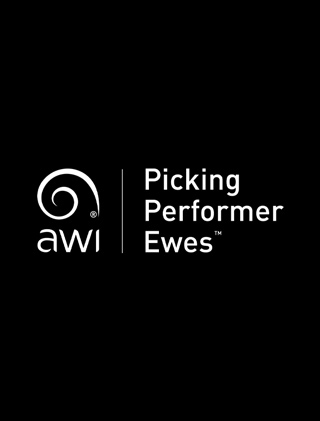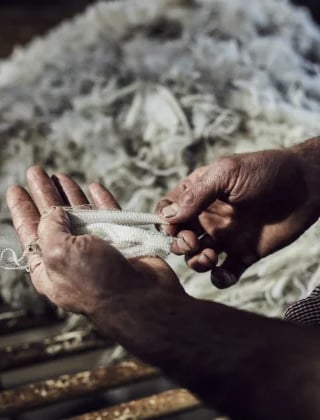Students take up merino wether challenge

Students from schools across NSW are gaining practical hands-on sheep management experience by looking after teams of Merino wethers for six months in preparation for a two-day competition in August.
More than 200 students from 32 NSW schools attended the first of two training days at the Dubbo Rural Skills Centre (pictured). 116 more students from 20 schools attended the second training day at the Jerilderie Saleyards complex.
Students from schools across NSW are gaining practical hands-on sheep management experience by looking after teams of Merino wethers for six months in preparation for a two-day competition in August*.
The 2020 School Merino Wether Challenge in NSW is the biggest one yet of this annual competition organised by the NSW Stud Merino Breeders' Association, with support from AWI. The initiative aims to educate and engage students on the commercial production of Merino sheep by giving them a memorable ‘hands on’ experience covering a broad range of sheep and wool production skills.
Similar competitions are held in South Australia by the SA Stud Merino Sheepbreeders Association and in Western Australia by the Stud Merino Breeders Association of Western Australia.
This year’s NSW School Merino Wether Challenge kicked off on 10 March at a training day with industry leaders at the Dubbo Rural Skills Centre, attended by more than 200 students from 32 schools across the region. Students undertook mini workshops on topics including agricultural careers, sheep selection using measured and visual appraisal, animal husbandry, nutritional requirements, sheep and wool handling and judging, and the profit drivers in Merino sheep production.
Two days later on 12 March, at the Jerilderie Saleyards complex in the Riverina, 116 more students from 20 schools across the region enjoyed a similar training day to that at Dubbo, rotating through a series of mini workshops to learn about the sheep and wool industry.
The training days were organised and run by Ben Watts of Bralca at Molong in NSW, the NSW Stud Merino Breeders' Association and AWI with generous support from property owners.
“Each school team at Dubbo and Jerilderie collected seven Merino wethers from the day which they are now looking after for six months. The students form a close relationship with their three wethers, which provides a unique ‘hands-on’ experience and insight into key components of good sheep management, in contrast to education in a classroom,” Ben said.
“Each team will show their wethers and be judged in a two-day competition at the Rabobank National Merino Sheep Show and Ram Sale in August. Students’ efforts will be judged according to the meat and wool quality of the flock.”
In particular, the teams will be assessed and four awards presented for:
- the team with the highest estimated earning capability over a five-year period from both meat and wool.
- the team with the highest commercial wool value. The wethers will be shorn during the competition, where fleeces will be weighed and valued.
- the team with the highest commercial meat value.
- the overall champion team. Points are awarded based on the students’ sheep handling, dress and presentation and knowledge of the Merino industry.
“As well as showcasing the Merino breed, it encourages the students to become familiar with, and possibly pursue a career within, the Merino industry,” Ben added.

Students from Gunnedah High School at the training day in Dubbo.
Following its success last year in winning the ‘Best Presented’ award, Gunnedah High School is taking part again this year. Sixteen of the school’s Year 9 students attended the training day in Dubbo and have taken some Merino wethers back to Gunnedah where the students will look after them in preparation for judging in August.
The school’s agriculture teacher Nicole Dwyer said Gunnedah High School has participated in the School Merino Wether Challenge for many years and she has personally taken students since 2017.
“The students get a lot out of participating in this program, from learning about sheep dietary requirements, handling, health and shearing whilst the wethers are at school for nearly six months,” Nicole said
“The contacts that they can make with leading industry individuals is very rewarding.
“These opportunities would be hard to provide our students without this program and the involvement of everyone in the Merino sheep industry that gives up their time to pass on some of their knowledge to our students.”
WHAT BENEFITS DOES THE CHALLENGE PROVIDE TO STUDENTS?
By attending the training day and the judging event in Dubbo, and by looking after their wethers, the students gain:
- practical, hands-on skills in sheep management
- a better understanding of sheep and wool production as a business
- contact with many aspects of the Merino sheep industry
- a chance to network with industry participants and other students
- an enjoyable experience with Merino sheep and the industry
- a positive perspective on a career with sheep and wool.
*Since the publication of this article in the June edition of Beyond the Bale, the proposed competition in August at the Rabobank National Merino Sheep Show and Ram Sale Dubbo is no longer happening, due to social distancing concerns. The sheep instead will be transported to Dubbo TAFE and shorn there.
This article appeared in the June 2020 edition of AWI’s Beyond the Bale magazine. Reproduction of the article is encouraged, however prior permission must be obtained from the Editor.















